The GIGABYTE X570 Aorus Xtreme Motherboard Review: Fanless AM4
by Gavin Bonshor on September 24, 2019 9:00 AM ESTSystem Performance
Not all motherboards are created equal. On the face of it, they should all perform the same and differ only in the functionality they provide - however, this is not the case. The obvious pointers are power consumption, but also the ability for the manufacturer to optimize USB speed, audio quality (based on audio codec), POST time and latency. This can come down to the manufacturing process and prowess, so these are tested.
For X570 we are running using Windows 10 64-bit with the 1903 update as per our Ryzen 3000 CPU review.
Power Consumption
Power consumption was tested on the system while in a single ASUS GTX 980 GPU configuration with a wall meter connected to the Thermaltake 1200W power supply. This power supply has ~75% efficiency > 50W, and 90%+ efficiency at 250W, suitable for both idle and multi-GPU loading. This method of power reading allows us to compare the power management of the UEFI and the board to supply components with power under load, and includes typical PSU losses due to efficiency. These are the real-world values that consumers may expect from a typical system (minus the monitor) using this motherboard.
While this method for power measurement may not be ideal, and you feel these numbers are not representative due to the high wattage power supply being used (we use the same PSU to remain consistent over a series of reviews, and the fact that some boards on our testbed get tested with three or four high powered GPUs), the important point to take away is the relationship between the numbers. These boards are all under the same conditions, and thus the differences between them should be easy to spot.
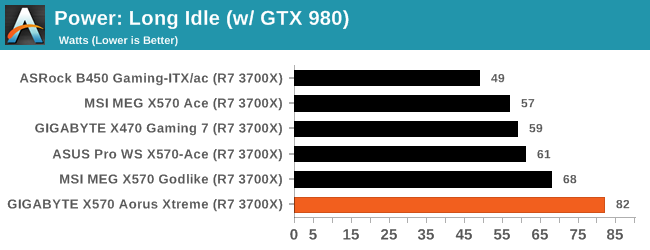
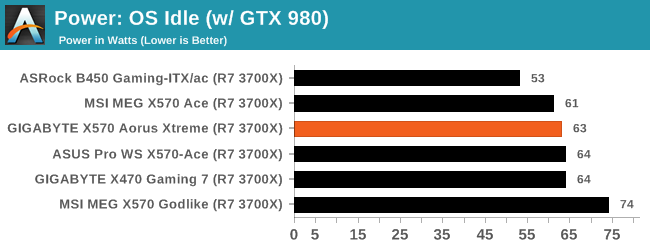
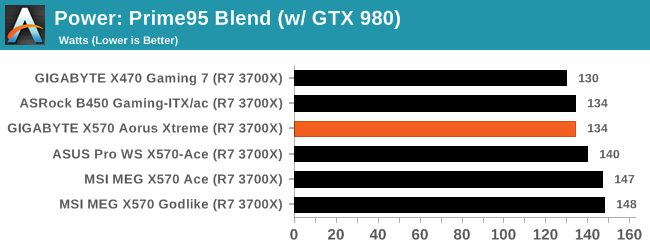
The power consumption at full load is very efficient with a clear cut lead of over 14 W over the MSI MEG X570 Godlike and 13 W over the slightly lesser spec MSI MEG X570 Ace. In our long Idle test, the X570 Aorus Xtreme performed surprisingly worse with a power draw of 82 W; this looks like an anomaly but this was tested three times with similar results, probably indicative of a system running something in the background when long idle is detected. Looking at our OS Idle result, this put the X570 Aorus Xtreme back into the normal range of results we've seen from AM4 motherboards with a respectable power draw of just 63 W.
Non-UEFI POST Time
Different motherboards have different POST sequences before an operating system is initialized. A lot of this is dependent on the board itself, and POST boot time is determined by the controllers on board (and the sequence of how those extras are organized). As part of our testing, we look at the POST Boot Time using a stopwatch. This is the time from pressing the ON button on the computer to when Windows starts loading. (We discount Windows loading as it is highly variable given Windows specific features.)
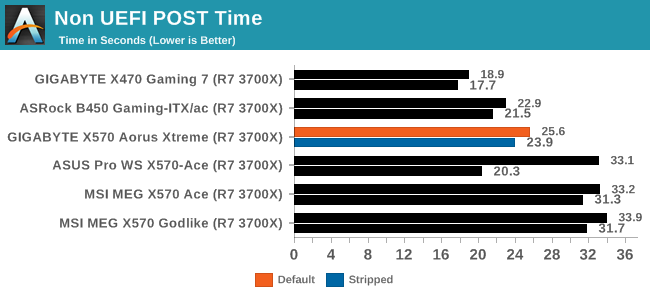
The GIGABYTE X570 Aorus Xtreme performed competitively with other boards on test with a default POST time of just over 25 seconds. This isn't too bad but doesn't quite match up with ASRock models we have tested so far which dominate our charts. With audio and networking controllers disabled, we managed to shave off a couple of seconds off the overall boot time.
DPC Latency
Deferred Procedure Call latency is a way in which Windows handles interrupt servicing. In order to wait for a processor to acknowledge the request, the system will queue all interrupt requests by priority. Critical interrupts will be handled as soon as possible, whereas lesser priority requests such as audio will be further down the line. If the audio device requires data, it will have to wait until the request is processed before the buffer is filled.
If the device drivers of higher priority components in a system are poorly implemented, this can cause delays in request scheduling and process time. This can lead to an empty audio buffer and characteristic audible pauses, pops and clicks. The DPC latency checker measures how much time is taken processing DPCs from driver invocation. The lower the value will result in better audio transfer at smaller buffer sizes. Results are measured in microseconds.
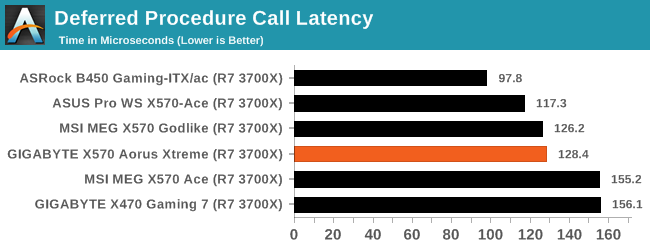
We test the DPC at the default settings straight from the box, and the GIGABYTE X570 Aorus Xtreme performed similarly to the MSI MEG X570 Godlike which this model competes with at the upper-end of the X570 product stack.










42 Comments
View All Comments
regsEx - Tuesday, September 24, 2019 - link
Would consider X570 Aorus Elite or Pro if they had warranty. But they built a system in Russia when Gigabyte is not responsible for anything. You can only rely on retailer. But if retailer is gone, you go do that yourself with your own problems.Asus and MSI do have after-sale service.
wilsonkf - Tuesday, September 24, 2019 - link
Every auto with PBO: 181W, 70 degree C.4200Mhz: 185W, 60 degree C.
This looks interesting.
Myrandex - Tuesday, September 24, 2019 - link
Looks like an interesting board, thanks for the review!I have to say I'm not sure what you meant by unformed in "provide a subtle, but unformed look." though
azrael- - Wednesday, September 25, 2019 - link
"Fanless AM4"? That's no feat.It should be "Fanless X570". Although I still struggle with the reason this should be a feat as well...
trishanatech - Wednesday, September 25, 2019 - link
usefulDr.Neale - Saturday, September 28, 2019 - link
There is a small error (typo, maybe) in Paragraph 6 [of 8] of the Conclusion:“... the biggest [VDroop] over compensation coming at our max overclock of 4.3 GHz at 1.375 V; the maximum load voltage observed was 1.380 V which is a 0.05 V [should read 0.005 V] increase over the set value.”
So VDroop is indeed tightly contolled, but within 0.005 V, not just 0.05 V !!!
I think this is a good thing, and the conclusion should state it correctly !
Dr.Neale - Saturday, September 28, 2019 - link
Sorry for MY typo, spelling “controlled” as “contolled”. Wish I could edit it...Gastec - Saturday, September 28, 2019 - link
GIGABYTE X570 Aorus Xtreme: $700MSI MEG X570 Godlike: $700
ASUS ROG Crosshair VIII Formula: $700
Tell me that's not collusion and price-fixing.
jessica92 - Monday, September 30, 2019 - link
GIGABYTE X570 motherboards based on the AMD X570 Chipset provide full support for 3rd Gen AMD Ryzen™ Processors. The all-new design is a testament to GIGABYTE's dedication to design quality. GIGABYTE X570 motherboards offer a rich list of features such as support for PCIe 4.0 and USB Type-C https://www.myloweslife.us/Gastec - Tuesday, October 1, 2019 - link
I wish I had a ban hammer, the likes of Mjölnir, to smite you all into oblivion.